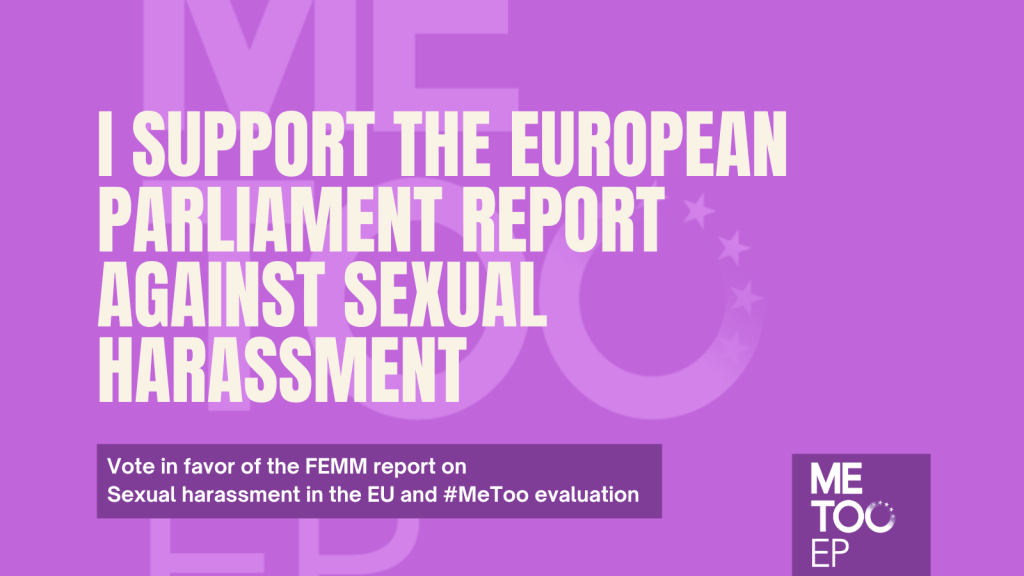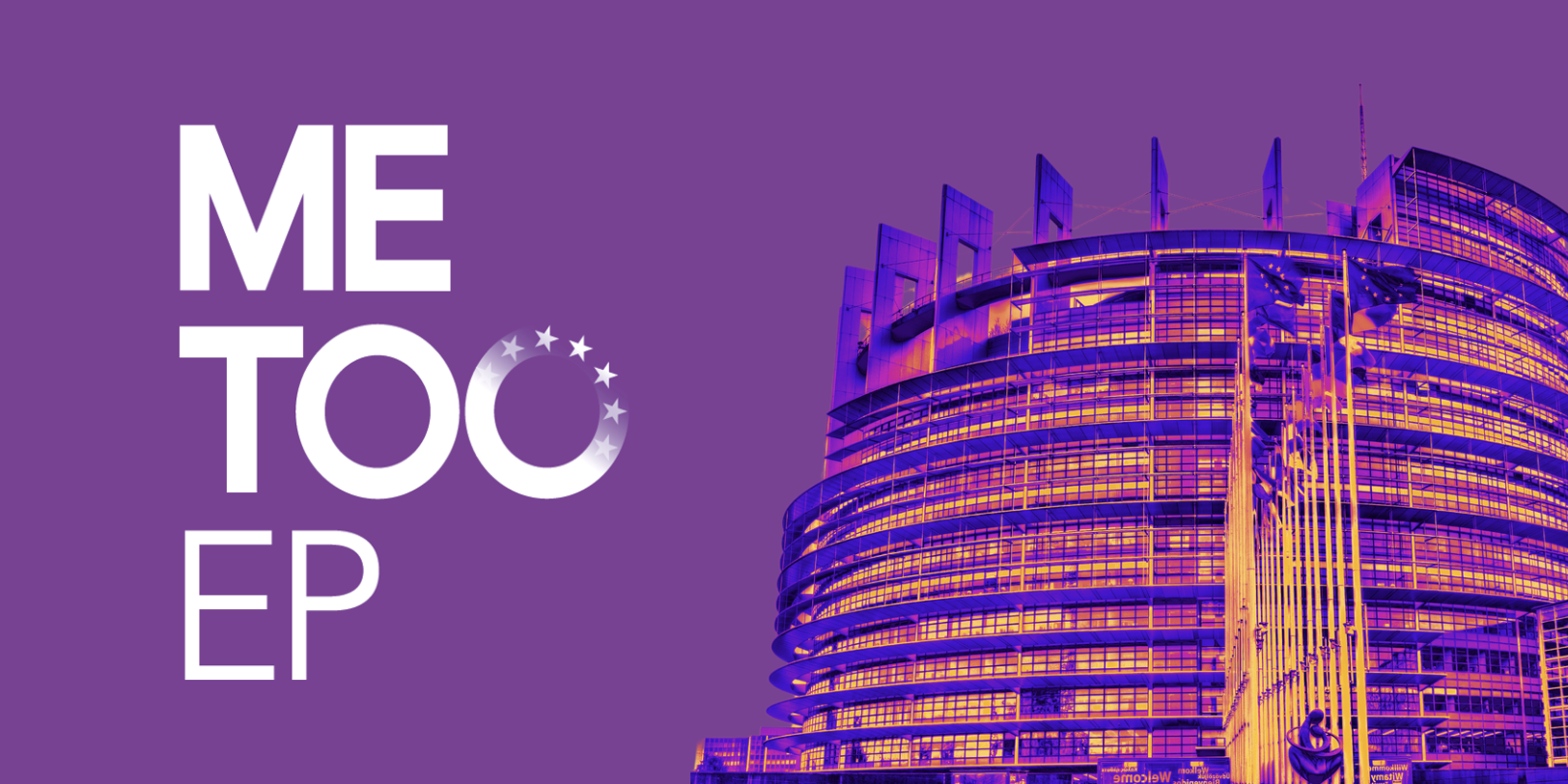Launched in March 2018 to combat sexual harassment and call for exemplary working conditions within the European Parliament, MeTooEP continues its fight to denounce all kinds of abuse, power imbalance and violence and harassment in the workplace.
We are a group of staff members in the European Parliament who believe that their employer should hold exemplary standards of good employment, and should therefore, combat sexual harassment, sexism and all sorts of abuse and above all, promote gender equality. By publishing testimonials of victims of sexual harassment and by campaigning through our activities and actions, our aim is to keep on raising awareness on gender equality and on gender-based violence and all forms of harassment, topics that are too often swept under the carpet when they should be considered as a priority for everyone’s safety and well-being. This is the start to change the culture of silence that is surrounding harassment in all its forms.
#MeTooEP movement was awarded EU Ombudsman Special Award 2019 for the work to raise awareness for zero tolerance for sexual harassment in the workplace in June 2019, and in 2023 we won the European Parliament Simon Veil Award for Gender Equality and Diversity.
Why we are here
In 2017, #MeToo went global and survivors and victims of sexual harassment broke the silence and bravely came forward with their stories. The European Parliament was not left untouched, as many victims also came forward with their stories, which were published in our blog. In the wake of these revelations, the European Parliament adopted a resolution 2017/2897(RSP) in October 2017, which called on the institution to act to prevent and combat sexual harassment.
This resolution included amongst many measures three crucial elements that would guarantee minimum standards of protection against harassment for all workers of the European Parliament: mandatory anti-harassment training, re-composition of the existing anti-harassment committees and an external audit.
Since the first resolution in 2017, the European Parliament has adopted 3 additional resolutions where calls have been made towards the institution on preventing and combating harassment, subsequently in 2019/2855(RSP), 2021/2986(RSP), and in 2021/2039 (INI).
Most proposed measures that were made in the past years in several resolutions, have not been implemented by the institution. That is why the EP’s Committee on Women’s Rights and Gender Equality (FEMM) decided in 2022 to work on yet another report, to urge the institution to finally act and take the needed measures to prevent and combat all forms of harassment, including sexual harassment. The European Parliament finally adopted its fifth resolution (2022/2138 (INI)) in Plenary on 1 June 2023.
Questions? Email us at: metoo-ep@europarl.europa.eu
Do you want to support our movement? You can contribute by:
- Supporting us with your donation, so we can continue our work here
- If you are staff, joining our movement here.
The demands of the #MeTooEP movement
- Mandatory anti-harassment trainings
In its resolutions of 2021/2039 (INI), 2021/2986(RSP), 2019/2855(RSP) 2018/2162(INI) & 2017/2897(RSP) the European Parliament adopted its position to have mandatory anti-harassment trainings for all Members and staff of the European Parliament. #MeTooEP supports this position, and advocates for consequences attached to the completion (or non-completion) of these trainings by MEPs. Certificates of participation in these trainings need to be published on the Members’ personal page on the EP website as well as in the form of a list of those MEPs who already participated as demanded by the resolution in 2021 . In addition, the 2021 resolution also calls for compulsory anti-harassment training for all staff of the European Parliament and an increased awareness raising to participate in these trainings. All anti-harassment trainings should be frequently available in every EU language, and with the possibility to follow them either individually or in groups and consequences need to be attached to non-participation in these trainings.
- Re-composition of the Parliament Advisory Committees dealing with harassment complaints
In its resolution 2021/2986(RSP), the European Parliament adopted its position to change the composition of the Advisory Committees dealing with harassment complaints to ensure it is fairly balanced and de-politicized, to include independent experts with proven expertise in tackling harassment issues in the workplace, including doctors, therapists and legal experts in the domain of harassment. These experts should be included as full members and have voting rights. MeTooEP supports this position, as a fair balanced harassment committee is needed for victims of harassment to feel safe and properly supported in the procedure of filing the complaint and subsequent consequences. In addition to that, a de-politicization of the anti-harassment committee would be advisable.
The same resolution also calls for annual publication by the Advisory committees of monitoring reports and risk assessments, in order to guarantee transparency on the situation of harassment cases in the European Parliament, and the follow up on improvements that could be made.
MeTooEP supports this position, and would also like to see a clearly defined mandate and a transparent selection process for the members of the Harassment committees, and frequent independent monitoring of the work of these committees.
- External Mediator
The European Parliament should appoint a professional external mediator that can act as a neutral party in mediation in relation to harassment cases, both in an informal and formal manner. This is crucial for victims of harassment who are often left to deal with the case by themselves. MeTooEP also welcomes the introduction of EP confidential counsellors, and advocates for stronger awareness raising on the existence and work of these confidential counsellors to ensure is accessibility for all EP staff, including MEP staff.
- Protection of whistle-blowers
The European Parliament should improve the internal structure that support and protect whistle-blowers when they want to rapport inappropriate behaviors or suspected breaches of the Rules of Procedures and/or EU law by Members and staff. Whistle-blowers should be guided and protected by the EP, as to avoid possible retaliation and to encourage reporting and create a culture of transparency and ethical behavior. This is especially important for witnesses of harassment cases, who often cannot make formal complaints when they witness harassment.
- Prevention and awareness raising
The European Parliament should actively promote a zero-tolerance harassment policy, by informing all its staff on what constitutes harassment and how to counter it, which places in the EP or outside they can go to if they witness or experience harassment, and what formal procedures are in place. The EP should actively promote participation in the anti-harassment trainings offered by the EP training service for all staff. The European Parliament should also take an active role in improving the exchanges of best practices on anti-harassment policy between EP and other EU institutions, and preferably also between national parliaments as the European Parliament has an exemplary institutional function vis-à-vis other institutions and parliaments.
- External Audit
An external audit of all existing structures preventing harassment in the European Parliament was called for in the 2017 resolution. To this date, this has not been executed to a sufficient extent. A previous audit has never been published or shared and was flawed from the outset in the sense that the auditors were chosen by the president of the harassment committee, which in itself can constitute a conflict of interest. Thus, a new audit needs to be conducted with results available to MEPs, EP staff as well as the general public.

